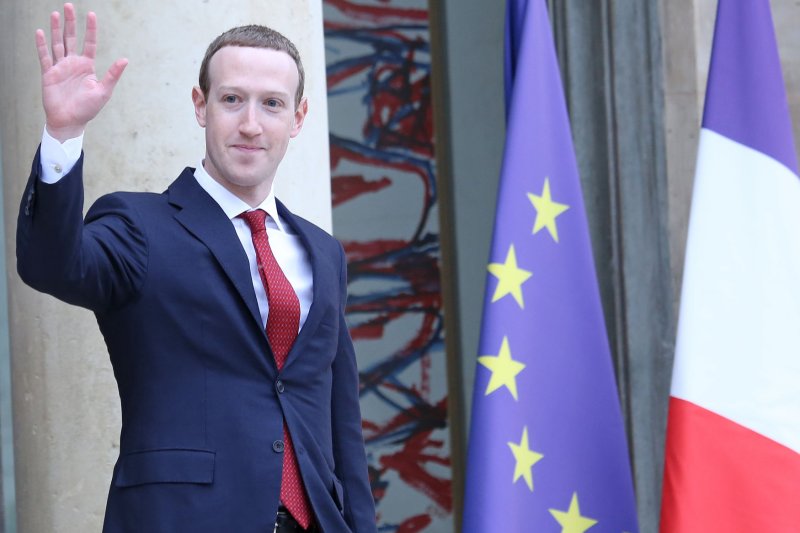Facebook CEO Mark Zuckerberg leaves the Elysee Palace in Paris, France, May 10 after meeting with French President Emmanuel Macron. Photo by David Silpa/UPI |
License Photo
May 30 (UPI) -- Facebook CEO Mark Zuckerberg will face a leadership vote Thursday, when shareholders meet to discuss the social media company's direction.
The meeting comes at a time of heightened criticisms for Zuckerberg, who owns a minority of Facebook shares -- but, because he's an early investor, he still controls nearly 60 percent of the company's voting power. It's a result of Facebook's dual-class voting structure, which gives early investors voting power 10 times more powerful than newer shareholders have.
Zuckerberg and his company have been at the center of multiple controversies recently, leading some to advocate for leadership change. The Cambridge Analytica scandal and the role of social media in Russia's campaign to disrupt the 2016 U.S. election are two subjects that have some calling for change at the top. Zuckerberg also faces a contempt charge in Canadia Parliament, for ignoring requests from lawmakers to testify.
Shareholder Julie Goodridge will submit another proposal to change the dual-voting structure, as she's done unsuccessfully at four straight meetings, but is almost certain to fail again.
"We [will] resubmit until we no longer can," Goodridge told Bloomberg. "Or until the company changes and meets our needs, which obviously they're not going to do. [Zuckerberg] has an impermeable wall around him that protects him from anybody else's perspective."
Proposals are included in an SEC filing for Thursday's meeting.
"Since July 2018, Facebook value dropped as much as 40 percent due to management and board decisions that have not protected shareholder value," the proposal reads. "By allowing certain stock more voting power, our company takes public shareholder money but does not provide us an equal voice in our company's governance ... Fake news, election interference, and threats to our democracy -- shareholders need more than deny, deflect and delay. We urge shareholders to vote FOR the recapitalization plan for all outstanding stock to have one vote per share."
Facebook co-founder Chris Hughes warned of Zuckerberg's increased power in a recent New York Times op-ed.
"Mark's power is unprecedented and un-American," he wrote.
Other proposals aim to break Facebook into smaller companies, and one seeks to hire an independent chairman to replace Zuckerberg.
In a recent filing this year, Facebook outlined an increase to Zuckerberg's security costs and his celebrity status. He has a multi-million dollar security allowance that includes the use of a private jet and a security detail, which was increased by $10 million last year.
"We believe that Mr. Zuckerberg's role puts him in a unique position: He is synonymous with Facebook and, as a result, negative sentiment regarding our company is directly associated with, and often transferred to, Mr. Zuckerberg," Facebook wrote. "Mr. Zuckerberg is one of the most recognized executives in the world in large part as a result of the size of our user base and our continued exposure to global media, legislative and regulatory attention."
Thursday's meeting comes a day after House Speaker Nancy Pelosi and former presidential candidate Hillary Clinton slammed the social media platform for refusing to remove a doctored video of Pelosi speaking -- slowed down to make her appear to be slurring. Clinton called the video "sexist trash."
"I think they have proven by not taking down something they know is false that they were willing enablers of the Russian interference in our election," Pelosi told KQED-TV. "We have said all along, poor Facebook, they were unwittingly exploited by the Russians. I think wittingly, because right now they are putting up something that they know is false."
Facebook has defended it's decision to leave the video on its platform, saying it made the footage less available in users' news feeds and added a notification that the video is false.















